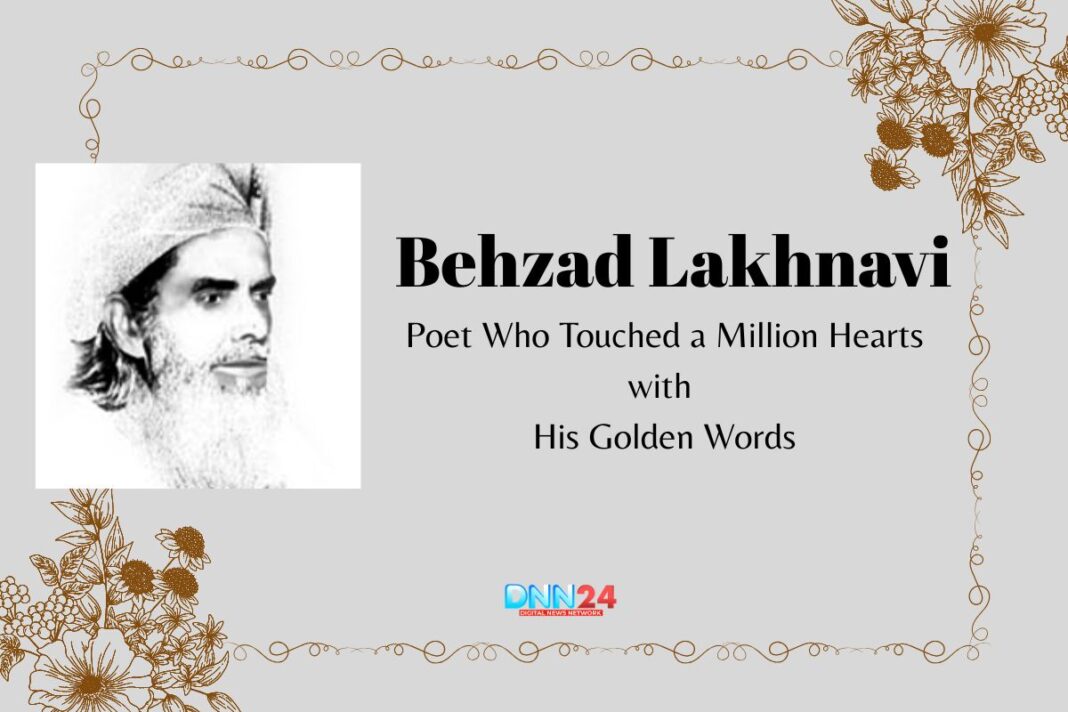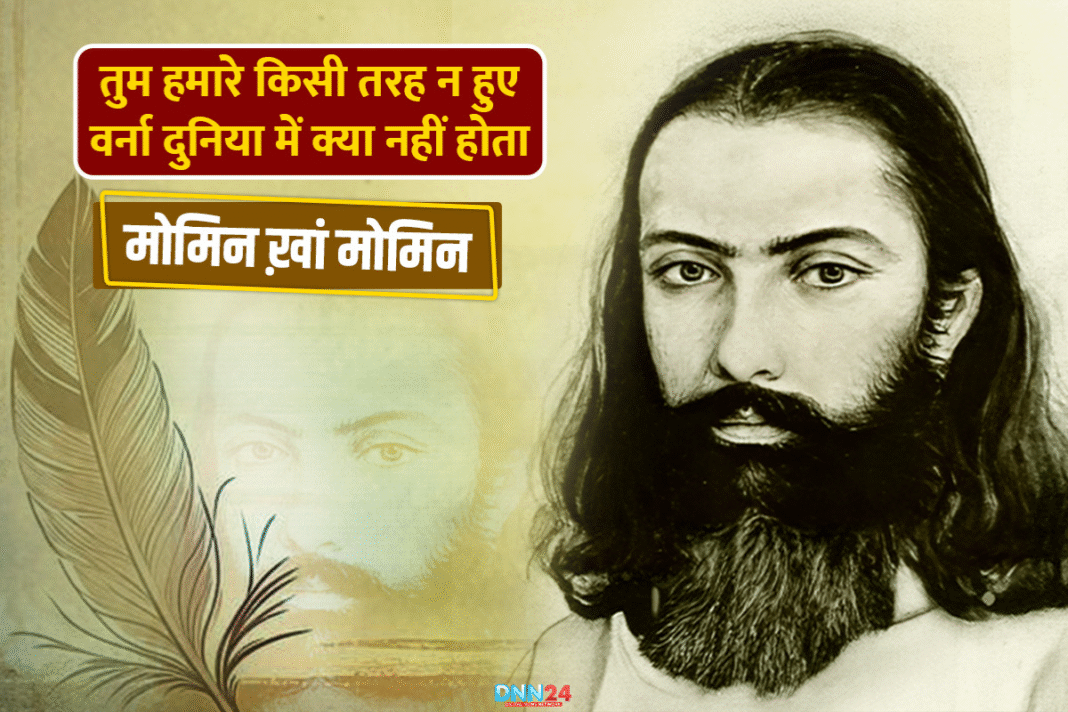Behzad Lakhnavi was born as Sardar Hussain Khan in 1900 in the royal city of Lucknow, where poetry flows like sweet music on every street corner. His family came from the brave Afridi community and moved from Rampur to Lucknow, carrying dreams and stories in their hearts. From childhood, little Behzad lived surrounded by beautiful poems and songs because his father was a respected poet who filled their home with magical words.
ai dil ki khalish chal yunhi sahi chalta to hoon un ki mehfil mein
Behzad Lakhnavi
us waqt mujhe chaunka dena jab rang pe mehfil aa jaaye
The young boy would sit quietly in poetry gatherings called mushairas, listening to grown-ups recite verses that made people cry and smile simultaneously. Teachers often found small poems written in his school notebooks during history lessons, showing that poetry was already calling him. Lucknow’s famous culture of art and literature became his first teacher, and the city’s gentle atmosphere helped shape his tender heart.
wafaaon ke badle jafa kar rahe hain
Behzad Lakhnavi
main kya kar raha hoon vo kya kar rahe hain
Even as a child, Behzad understood that words have special powers to heal pain and bring happiness. He would spend long afternoons under neem trees, creating his own verses about simple things like butterflies, raindrops, and the laughter of children playing in narrow lanes. These early days in Lucknow gave him the foundation that would later help him become one of India’s most beloved poets.
Dreams Meeting Reality: The Struggle Years
After finishing his studies, Behzad joined the East India Railway as a Train Ticket Inspector, a steady job that promised regular meals but could not feed his hungry soul. While checking tickets and managing train compartments, he secretly wrote poems on small pieces of paper, and passengers sometimes requested him to recite his beautiful verses during long journeys.
aata hai jo toofaan aane de kashti ka khuda khud hafiz hai
Behzad Lakhnavi
mumkin hai ki uthti lahron mein bahta hua saahil aa jaaye
Life took a difficult turn when Behzad suffered a heart attack early in his career, forcing him to leave his railway job and face financial troubles. 1932 brought new hope when he joined All India Radio, where his voice and words reached thousands of homes nationwide. However, the radio world was demanding, with tight schedules and constant pressure to create fresh content.
ai jazba-e-dil gar main chahoon har cheez muqabil aa jaaye
Behzad Lakhnavi
manzil ke liye do gaam chaloon aur saamne manzil aa jaaye
During these challenging times, Behzad travelled to different cities for poetry recitals, sometimes returning home with barely enough money for tea and bread. Still, his heart remained full of satisfaction and pride. The partition of India in 1947 changed everything completely, separating him from his beloved Lucknow and forcing him to start a new life in Karachi, Pakistan. This painful separation from familiar places and dear friends inspired some of his most touching poems about longing and loss.
main dhoondh raha hoon meri vo shama kahan hai
Behzad Lakhnavi
jo bazm ki har cheez ko parwana bana de
Hidden Stories That Touch the Heart
Many beautiful incidents from Behzad’s life remain unknown, but they show his kind nature and deep spiritual connection. One such story involves his visits to the Niaziya Monastery in Bareilly, where he would go to find peace and write poems in complete silence. During one peaceful evening at this holy place, he composed the famous ghazal “Ae Jazba-e-Dil Gar Main Chahoon,” which later comforted millions of listeners.
zinda hoon is tarah ki gham-e-zindagi nahin
Behzad Lakhnavi
jalta hua diya hoon magar roshni nahin
Friends remember how Behzad would help struggling poets by inviting them for tea and writing verses together, turning their failures into success stories overnight. His letters reveal a generous heart that loved surprising fellow writers with handwritten poems and thoughtful gifts. Once, during a poetry gathering, a stray dog entered the venue, and instead of shooing it away, Behzad welcomed the animal with a funny verse that made everyone laugh and applaud.
ham bhi khud ko tabah kar lete
Behzad Lakhnavi
tum idhar bhi nigah kar lete
Another touching story comes from Lahore, where Behzad helped a film crew by writing lyrics during a rainy night, creating words so moving that everyone present had tears. Though small, these simple acts of kindness profoundly affected people’s lives. His art grew from real experiences of both sadness and joy, keeping his words always filled with hope and light that could brighten anyone’s darkest moments.
The Magic in His Beautiful Writings
Behzad Lakhnavi’s poetry lives on through his wonderful collections, such as “Naghma-o-Noor,” “Kaif-o-Suroor,” and “Mauj-e-Tahoor,” each book containing verses that speak directly to the human heart. His naats, poems praising Prophet Muhammad, beautifully combine deep spirituality with strong emotions, making listeners feel closer to their faith and inner peace.
mujhe to hosh na tha un ki bazm mein lekin
Behzad Lakhnavi
khamoshiyon ne meri un se kuch kalaam kiya
The famous singer Begum Akhtar became popular partly through Behzad’s ghazal “Diwana Banana Hai Toh Diwana Bana De,” which played on radio stations everywhere and made people love his words. His most quoted verse, “Ai Jazba-e-Dil Gar Main Chahoon Har Cheez Muqabil Aa Jaye”, teaches us to find strength during difficult times and never lose hope.
ishq ka ejaaz sajdon mein nihaan rakhta hoon main
Behzad Lakhnavi
naqsh-e-paa hoti hai peshani jahan rakhta hoon main
Beyond poetry, Behzad wrote radio plays and children’s stories that brought smiles to families during tough times. He had a special way of editing his poems at the last moment, sometimes changing a single word after seeing something beautiful on the street, like a child playing or an older man feeding birds. The film industry also benefited from his talent, with many movies featuring his meaningful lyrics. When people praised his work, he humbly said that his pen held no magic, only the blessings of elders and prayers of friends.
A Legacy That Lives Forever
Behzad Lakhnavi passed away in Karachi on October 10, 1974, but his words continue to live in the hearts of poetry lovers everywhere. His life teaches us that true greatness comes not from conquering the world, but from facing personal struggles with dignity and grace while spreading love through simple acts of kindness.
go muddatein hui hain kisi se juda hue
Behzad Lakhnavi
lekin ye dil ki aag abhi tak bujhi nahin
His untold stories remind us that every poet has a complete life beyond their published verses, filled with hopes, dreams, small victories, and daily challenges that ordinary people face. Behzad’s journey proves that wounds can heal through beautiful words and simple gestures of love and understanding can change someone’s life direction.
bahzad saaf saaf main kehta hoon haal-e-dil
Behzad Lakhnavi
sharminda-e-kamaal meri shairi nahin
Today, when people read his poems or listen to his ghazals, they find comfort in difficult times and the strength to face tomorrow’s challenges. His verses invite readers to discover beauty even in hardship and courage in gentleness. Behzad Lakhnavi’s life perfectly shows us that the most powerful poetry comes from mixing absolute joy with real suffering, creating words that continue to comfort, inspire, and encourage hearts across generations and borders, proving that good poetry never dies.
Also Read: Deep Narayan Nayak: Teacher of the Street Who Turned Walls into Blackboards
You can connect with DNN24 on Facebook, Twitter, and Instagram and subscribe to our YouTube channel.



